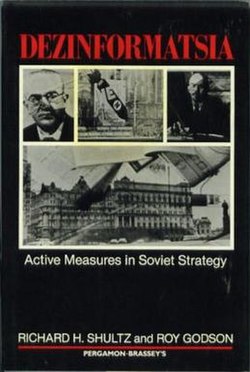 Dezinformatsia | |
| Authors | Richard H. Shultz and Roy Godson |
|---|---|
| Original title | Dezinformatsia: Active Measures in Soviet Strategy |
| Language | English |
| Subject | Disinformation |
| Genre | non-fiction |
| Publisher | Pergamon-Brassey's |
Publication date | 1984 |
| Publication place | United States |
| Media type | Paperback |
| Pages | 210 |
| ISBN | 978-0-08-031573-7 |
| Followed by | The Soviet Union and Revolutionary Warfare (1990) |
| [1][2][3] | |
Dezinformatsia: Active Measures in Soviet Strategy (and a later edition published as Dezinformatsia: The Strategy of Soviet Disinformation) is a non-fiction book about disinformation and information warfare used by the KGB during the Soviet Union period, as part of their active measures tactics. The book was co-authored by Richard H. Shultz, professor of international politics at Tufts University, and Roy Godson, professor emeritus of government at Georgetown University.
Shultz and Godson discuss Soviet disinformation tactics including injection of Communist propaganda through covert groups within the U.S.S.R. tasked with disrupting activities of the North Atlantic Treaty Organization and the U.S. The book explains disinformation methods including forgery as covert operation, agents of influence, and using social influence to turn targets into useful idiots. They focus on disinformation activities of Soviet intelligence from 1960 to 1980. Shultz and Godson discuss case studies as examples of Soviet disinformation, including a French journalist covertly financed by Russian agents in order to publish biased material against Western interests, and the front organization activities of the World Peace Council. They back up their analyses with two Soviet intelligence defectors.
Foreign Affairs called the book a "useful survey" of how Soviet intelligence used disinformation "to further its strategic aims such as discrediting America and weakening NATO".[4] The Journal of Conflict Studies described it as "a useful introduction to a field of knowledge" of importance to security experts, the United States Intelligence Community, and diplomats.[1] Society called Dezinformatsia, "a highly readable and insightful book".[2] Political Science Quarterly gave the work a negative review, criticizing the book's writing style and methodological rigor.[3]
- ^ a b Cite error: The named reference
charterswas invoked but never defined (see the help page). - ^ a b Cite error: The named reference
societywas invoked but never defined (see the help page). - ^ a b Cite error: The named reference
psqwas invoked but never defined (see the help page). - ^ Cite error: The named reference
campbellwas invoked but never defined (see the help page).